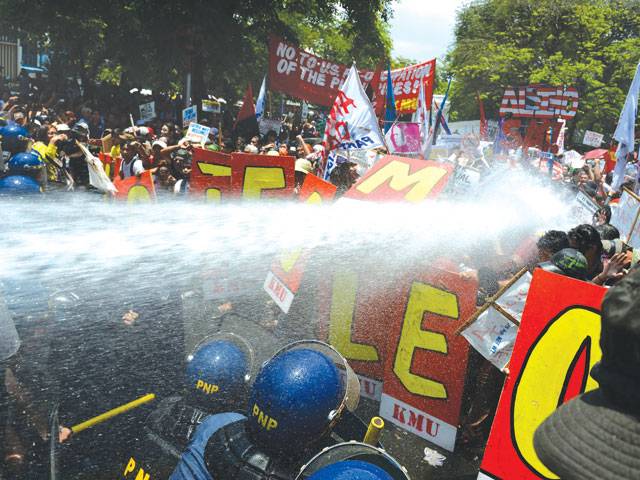MANILA - Barack Obama ended an Asian tour Tuesday with a warning to China against using force in territorial disputes, as Chinese authorities accused the US president of ganging up with “troublemaking” allies.
The barbs ensured a tense finish to a four-nation trip dominated by the worsening maritime rows between China and US allies in the region, which have triggered fears of military conflict.
“We believe that nations and peoples have the right to live in security and peace, to have their sovereignty and territorial integrity respected,” Obama told a gathering of US and Filipino troops in Manila. “We believe that international law must be upheld, that freedom of navigation must be preserved and commerce must not be impeded. We believe that disputes must be resolved peacefully and not by intimidation or force.”
Close American ally the Philippines has been embroiled in one of the highest-profile territorial disputes with China, over tiny islets, reefs and rocks in the South China Sea. China claims nearly all of the South China Sea, which is believed to contain huge deposits of oil and gas, even waters and islands or reefs close to its neighbours.
The Philippines, which has one of the weakest militaries in the region, has repeatedly called on longtime ally the United States for help as China has increased military and diplomatic pressure to take control of the contested areas. The Philippines and the United States signed an agreement on Monday that will allow a greater US military presence on Filipino bases.
And Obama sought on Tuesday to reassure the Philippines that the United States would support its ally in the event of being attacked, citing a 1951 mutual defence treaty between the two nations.
“This treaty means our two nations pledge, and I am quoting, ‘our common determination to defend themselves from external armed attacks’,” Obama said.
“And no potential aggressor can be under the illusion that either of them stands alone. In other words, our commitment to defend the Philippines is ironclad. The United States will keep that commitment because allies will never stand alone.”
Nevertheless, Obama did not specifically mention coming to the aid of the Philippines if there were a conflict over the contested South China Sea areas, as his hosts had hoped.
On the first leg of his Asian tour in Tokyo, Obama had made such a pledge of support to Japan, which is locked in its own dispute with China over rival claims to islands in the East China Sea. Obama’s nuanced position on the Philippines was part of a tight-rope act he had tried to perform during his trip - reassuring allies wary about China’s perceived increased hostility while not antagonising the leadership in Beijing.
While offering pledges of protection to Japan and the Philippines, Obama also insisted the United States was not seeking to counter or contain China.
And reflecting the difficulties of Obama’s balancing act, there were complaints in the Philippines that he had not offered explicit support in the event of a conflict over the contested South China Sea areas.
“No firm commitment from US to defend PH,” said the front-page headline of the Philippine Daily Inquirer after Obama met president Benigno Aquino on Monday but did not pledge South China Sea backing.
Nevertheless, an editorial in the state-run China Daily newspaper on Tuesday signalled that Chinese authorities viewed Obama’s trips to Japan, South Korea, Malaysia and the Philippines as a tour of anti-Chinese hostility. “It is increasingly obvious that Washington is taking Beijing as an opponent,” the editorial said as it summarised his visit. “With Obama reassuring the US allies of protection in any conflict with China, it is now clear that Washington is no longer bothering to conceal its attempt to contain China’s influence in the region.”
The editorial warned against believing Obama’s “sweet promises” of a new, constructive relationship between the United States and China, and instead outlined what it described as a “grim geopolitical reality”.
“Ganging up with its troublemaking allies, the US is presenting itself as a security threat to China,” it said.
Meanwhile, three Chinese coastguard ships sailed into waters around the islands in the East China Sea disputed between China and Japan, the Japanese coastguard said.
It said the vessels entered 12 nautical miles (22 kilometres) into Japan’s territorial waters off one of the Senkaku islands, which China also claims and calls the Diaoyus.
It was the second such move since Obama announced last week that Washington would defend Japan if China initiates an attack in the contested area.
Tuesday, April 16, 2024
Obama ignites Chinese anger as he warns against force

Caption: Obama ignites Chinese anger as he warns against force
Muslim K-popstar Daud Kim buys land to build mosque in South Korea
10:33 PM | April 16, 2024
Punjab Stadium unavailability derails National Challenge Cup 2023 Final Round
10:28 PM | April 16, 2024
Death anniversary of comedian Babu Baral being observed today
10:12 PM | April 16, 2024
Heavy rains lash UAE and surrounding nations as the death toll in Oman flooding rises to 18
10:11 PM | April 16, 2024
Israel's military chief says that Israel will respond to Iran's weekend missile attack
10:11 PM | April 16, 2024
Political Reconciliation
April 16, 2024
Pricing Pressures
April 16, 2024
Western Hypocrisy
April 16, 2024
Policing Reforms
April 15, 2024
Storm Safety
April 15, 2024
Democratic harmony
April 16, 2024
Digital dilemma
April 16, 2024
Classroom crisis
April 16, 2024
Bridging gaps
April 16, 2024
Suicide awareness
April 15, 2024
ePaper - Nawaiwaqt
Advertisement
Nawaiwaqt Group | Copyright © 2024





